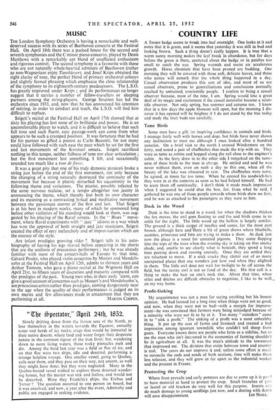MUSIC
THE London Symphony Orchestra is having a remarkable and well- deserved success with its series of Beethoven concerts at the Festival Hall. On April 18th there was a packed house for the second and seventh symphonies and the C minor piano concerto, played by Denis Matthews with a remarkably apt blend of unaffected enthusiasm and rigorous control. The second symphony is a favourite with those who are not naturally whole-hearted admirers of Beethoven (rather as non-Wagnerians enjoy Tannhauser), and Josef Krips obtained the right clarity of tone, the perfect blend of primary orchestral colours and slightly formal phrasing which emphasise the close relationship of the symphony to its eighteenth-century predecessors. The L.S.O. has greatly improved under Krips ; and its performances no longer suggest that it carries a number of fellow-travellers or sleeping partners among the string-players. George Stratton has led the orchestra since 1933, and, now that he has announced his intention of retiring, in order to conduct and teach, the L.S.O. will find him difficult to replace.
Szigeti's recital at the Festival Hall on April 17th showed that at sixty his playing has lost none of its brilliance and power. He is an uncomfortable player to watch, and it is difficult to believe that such full tone and such fluent, easy passage-work can come from what appears to be such a cramped position. It was fortunate that he had for his partner so gifted a pianist as Carlo Bussotti, for not many could have followed with such ease the pace which he set for the first and last movements of the Kreutzer sonata. Szigeti sacrificed nothing to this tempo, neither fullness of tone nor clear articulation ; but the first movement lost something, I felt, and occasionally sounded too much like a tottrAle force.
It was a great pity that one of his truly demonic pizzicati broke a string just before the end of the first movement, not only because the changing of a string naturally destroyed the continuity of the movement but because it plainly disturbed his equanimity in the following theme and variations. The pianist, possibly infected by the same nervous malaise, set a tempo altogether too jaunty in announcing the theme, which thereby lost both its own character and its meaning as a contrasting lyrical and meditative movement between the passionate storms of the first and last. That Szigeti is at his best in modern works, many of which he sponsored long before other violinists of his standing would look at them, was sug- gested by his playing of the Ravel sonata. In the Blues " move- ment, where Ravel experiments with " jazz " idioms in a way which has won the approval of both straight and jazz musicians, Szigeti created the effect of eery melancholy and of improvisation which are the essence of the style.
Are infant prodigies growing older ? Szigeti tells in his auto- biography of having his legs shaved before appearing in the shorts that are the uniform of precocious performers ; but he was already familiar with most of the concert-halls of Europe by that time. Gerard Poulet, who played violin concertos by Mozart and Mendels- sohn at the Festival Hall on April 12th, admits to thirteen years and Arthur Tomson, who gave a piano recital at the Wigmore Hall on April 21st, to fifteen years of discretion and maturity compared with the prodigies of the past. Young men who, in their early 'teens, can give a good account of concertos such as Mozart's and Mendelssohn's, are precocious artists rather than prodigies, coming dangerously near to the age when the quality of their performances is judged on its own merits and few allowances made in amazement that they are


































 Previous page
Previous page